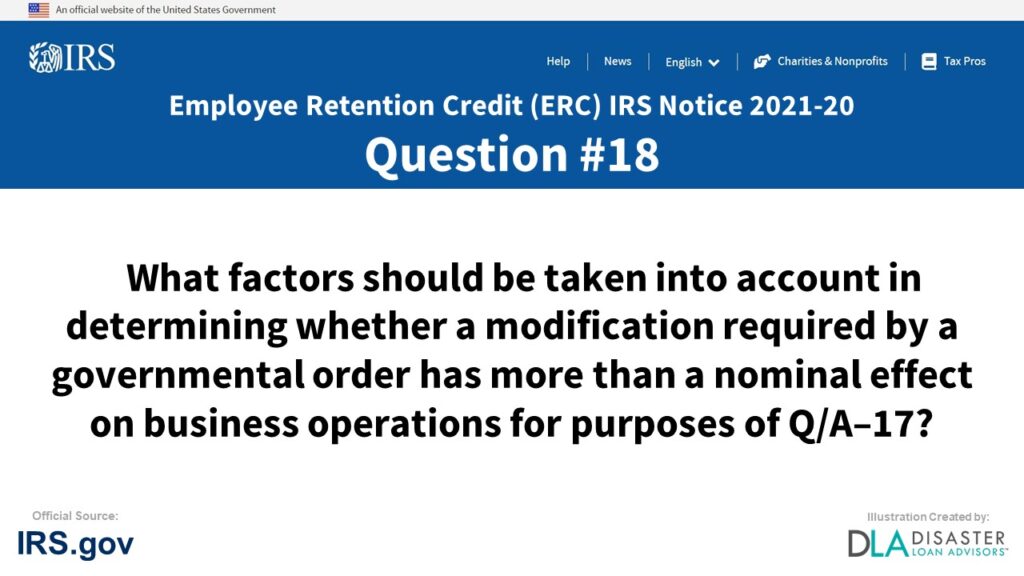
Question #18:
What factors should be taken into account in determining whether a modification required by a governmental order has more than a nominal effect on business operations for purposes of Q/A–17?
Found under the D. Full or Partial Suspension of Trade or Business Operations section of the Employee Retention Credit (ERC) IRS Notice 2021-20 with updated guidance to help business owners follow the current ERC rules.
The answer to question #18, What factors should be taken into account in determining whether a modification required by a governmental order has more than a nominal effect on business operations for purposes of Q/A–17?, can be found below.
ERC IRS Notice 2021-20 Question #18:
D. Full or Partial Suspension of Trade or Business Operations
What factors should be taken into account in determining whether a modification required by a governmental order has more than a nominal effect on business operations for purposes of Q/A–17?
The types of modifications that are contemplated by Q/A–17 are those required by a governmental order as a condition of reopening a physical space for business or service to the public. Examples of these modifications include: limiting occupancy to provide for social distancing, requiring services to be performed only on an appointment basis (for businesses that previously offered walk-in service), changing the format of service (for example, restrictions on buffet or self-serve, but not prepackaged or carry-out), or requiring employees and customers to wear face coverings.
The mere fact that an employer must make a modification to business operations due to a governmental order does not result in a partial suspension unless the
modification has more than a nominal effect on the employer’s business operations. Whether a modification required by a governmental order has more than a nominal effect on the business operations is based on the facts and circumstances. A governmental order that results in a reduction in an employer’s ability to provide goods or services in the normal course of the employer’s business of not less than 10 percent will be deemed to have more than a nominal effect on the employer’s business operations. For example, occupancy restrictions at a restaurant with indoor dining service may result in an actual, and more than nominal, reduction of the restaurant’s ability to service customers; however, an occupancy restriction at a retailer with sufficient physical space to accommodate its customers regardless of the restriction will likely not result in an actual, and more than nominal, reduction of the retailer’s ability to provide goods to its customers.
Modifications altering customer behavior (for example, mask requirements or making store aisles one way to enforce social distancing) or that require employees to wear masks and gloves while performing their duties will not result in more than a nominal effect on the business operations.
For more information about the Employee Retention Credit (ERC) IRS Notice 2021-20, visit the Internal Revenue Service (IRS) Department of the Treasury, official IRS.gov tax website.
Conclusion and Summary on What factors should be taken into account in determining whether a modification required by a governmental order has more than a nominal effect on business operations for purposes of Q/A–17? – #18 ERC IRS Notice 2021-20
The answer to Question #18: “What factors should be taken into account in determining whether a modification required by a governmental order has more than a nominal effect on business operations for purposes of Q/A–17?” was answered in detail above. It was found under section “D. Full or Partial Suspension of Trade or Business Operations in IRS Notice 2021-20.
Leave a comment below if you have further questions on the Employee Retention Credit (ERC) or for clarifications on What factors should be taken into account in determining whether a modification required by a governmental order has more than a nominal effect on business operations for purposes of Q/A–17?
Employee Retention Tax Credit (ERTC): Expert Assistance to Claim Your Business ERC Credit
Up to a $26,000 ERC Refund from the IRS for Each Employee
Disaster Loan Advisors can assist your business with the complex and confusing Employee Retention Credit (ERC), Form 9418-X, and the Employee Retention Tax Credit (ERTC) program.
Depending on eligibility, business owners and companies can receive up to $26,000 per employee based on the number of W2 employees you had on the payroll in 2020 and 20218.
The ERC / ERTC Tax Credit Program is a valuable IRS tax credit you can claim. This is money you have already paid to the IRS in payroll taxes for your W2 employees.
We DO NOT charge a percentage (%) of your ERC Refund like some companies are charging. Some ERC firms out there are charging upwards of 185% to 35% of your ERC refund!
Our professional ERC fee and pricing structure is very reasonable in comparison.
If you are looking for an ERC Company that believes in providing professional ERC Services and value, in exchange for a fair, reasonable, and ethical fee for the amount of work required, Disaster Loan Advisors is a good fit for you.
Schedule Your Free Employee Retention Credit Consultation to see what amount of employee retention tax credit your company qualifies for.
Cover Image Credit: Irs.gov / IRS Notice 2021-20 / Disaster Loan Advisors.
